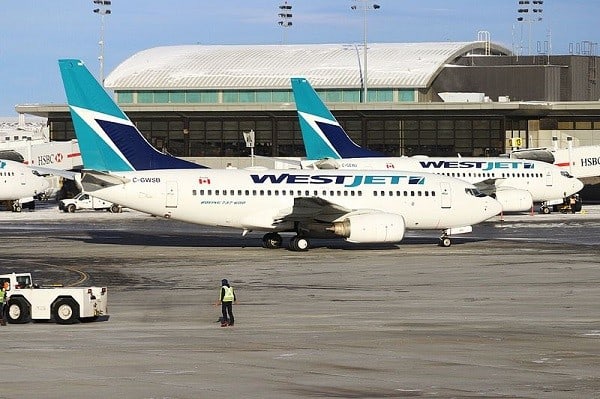

It’s safe to say that WestJet shareholders aren’t a happy lot as of late. The stock took a beating after the company’s Q2 financials, released on July 31, revealed a quarterly loss, the first for WestJet in 13 years.
WestJet’s revenue rose to $1.09 billion for the quarter, up from $1.06 billion a year earlier, but the air carrier lost $20.8 million or 18 cents a share, compared to last year’s profit of $41 million or 41 cents for Q2/17. Already down 24 per cent for the year, the stock has dropped another 13 per cent since the earnings release.
CEO Ed Sims chalked up the poor quarter to rising fuel costs, going so far as to say that travellers should brace for higher fares. “I think this is the way guests now need to think, is that airfares will be rising just as they did back in 2010, 2011 when we had the last major fare spike,” Sims said.
But the unionization of its employees has been another factor for WestJet, which earlier this year avoided a strike by its unionized pilots. Just last week, it was reported that a majority of WestJet’s 3,000 flight attendants have signed union cards, with the Canadian Union of Public Employees (CUPE) filing an application to represent them.
Driscoll spoke to BNN Bloomberg and said that the union issues and higher fuel costs are working as a double whammy against WestJet. “Their last quarter was okay,” Driscoll says, “And the stock price has gone down simply because they didn’t have that kind of knockout quarter.”
“If oil prices go down or stabilize, they’re getting more jets in play which are going to be more fuel-efficient, so that should help them on one side of the deal. And then the other side is, what are they going to do with the union going forward?” he says.
This week, WestJet’s flight dispatchers became the latest of WestJet’s employees to seek unionization.
Notorious for being severely impacted by the slightest of economic downturns, airlines are generally just too risky for your investment dollars, argues Driscoll. “I don’t think [WestJet’s] dividend is in any doubt … [but] I never own airlines because they don’t generate consistently growing free cash flow because their capital expenditures are so high,” he says.
“It’s like the old Warren Buffett saying — every time he wants to buy an airline, he has to call a person and say, ‘Hi, my name is Warren and I’m an air-holic. Please prevent me from buying these things,’” Driscoll says.
Leave a Reply
You must be logged in to post a comment.





 Share
Share Tweet
Tweet Share
Share




Comment